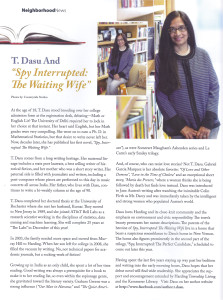All that sexy data
It is no secret that I am addicted to data. I love numbers almost as much as I love writing. These days even political campaigns and nonprofit foundations are all agog about using “data science”. In fact, Paul Rudnick wrote in 2012 that statisticians were the new sexy vampires. So, in the spirit of the Age of Data, I thought I’d spice up my writing career through some thoroughly unscientific experiments with data.
***Disclaimer: The discussion in this blog post is based solely on the study of my website Tamraparni Dasu and my Facebook author site, and cannot be generalized.
Typically, after the initial burst of energy that accompanies a book release, things get alarmingly quiet. If you are not Salman Rushdie or Jonathan Franzen, your book will wither and fade and ultimately go to rest in the graveyard of books. Unless you keep giving it little vitamin shots, which by the way, are not guaranteed to keep it breathing. The hope is that you keep it limping along until your next book comes along and it’s buzz will drag along the earlier book and so on until you make it to the New York Times’ best seller list. Easy!
The two-part question, therefore, is, what are these vitamin shots and how do we measure their effectiveness?
A vitamin shot is any action that could potentially increase the number of people who know about your book. Publicizing your book is the only thing you can control–you can’t make people buy your book, nor can you make them read it. Author events at libraries and book stores, articles in magazines and newspapers are real world actions; online giveaways, discounts, posting to social media networks, getting mentioned in popular blogs are online actions. And of course, getting picked up by a book club like Oprah’s is the ultimate vitamin shot that gives you and your book eternal life.
A vitamin shot is effective if it drives traffic to your website because the number of visits to your website is a proxy for the number of people that now “know” about your book. Facebook Insights, Google Analytics and almost all website hosting services provide ways of tracking traffic through your website. They grab “eyeballs” that wander over to your website and categorize and count them by time of day, day of week, age, gender, location, referring websites, and how long they perused your website and which pages on your site they spent most time on. In general, all data are anonymized and aggregated so that no personal information is revealed.
When I started examining the data provided by Facebook Insights and Google Analytics, there were two things that surprised me. First, a lot of traffic comes from websites ending in “dot ru”, scam sites based in Russia, presumably. Do they, as a matter of principle, trawl every website on the Internet (probably!), or was there something particularly alluring about my website? Second, my most popular post BY FAR, was A Thinking Woman’s Spy and I still can’t figure out why. Was it the pretty flower? Did the international spy community suddenly take an interest? Or was it the use of the words “thinking” and “woman”, that too in the same sentence? Very curious.
In my next post, I will describe some of my other experiments.
(***I would like to give a shout out to my friend and writer, Spencer Seidel, for getting me thinking along these lines; also, to Tara Sarath, for suggesting that I should post on this subject.)









